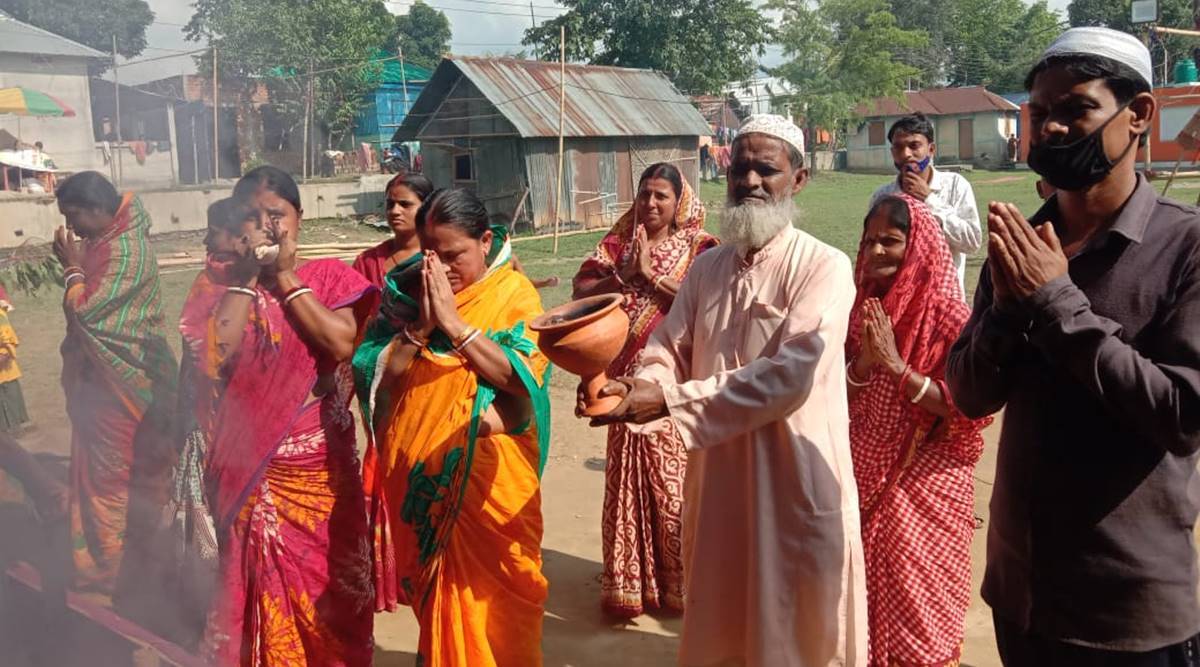This year, the Mollapara Durga Puja committee has cancelled cultural programmes, and is instead organising food distribution drives in their neighbourhood.

Setting an example of unity and brotherhood, Hindus and Muslims in a slum on the outskirts of Agartala have been organising a Durga Puja together for 19 years now. This time too, the two communities of Mollapara slum, one of the 59 registered slums in and around Agartala municipal council areas, have set up a Durga Puja pandal at Tular Maath, a playground.
The Durga Puja committee here consists of 31 members, including 18 Muslims and 13 Hindus. This time, the committee took no money from those outside their slum, but raised Rs 55,000 among themselves, and through donations from some patrons, managed to arrange Rs 80,000 for the Puja, lower than the previous year’s budget of Rs 1.2 lakh.
Speaking to indianexpress.com, president of Mollapara Durga Puja committee Ruhiz Miah said with the Covid-19 pandemic this year, they are using a big part of their budget for welfare activities in the slum. At the pandal, their focus is on maintaining social distancing, ensuring everyone wears a face mask and uses sanitisers.
“We are a mixed habitation of some 200-odd families at Mollapara, including Hindus and Muslims. We started our collaborative Puja in 2002 to enjoy the festivities and avoid any violence and misunderstanding,” Ruhiz Miah said.
The residents at Mollapara are mostly daily wagers, rickshaw pullers, vendors etc.
“We are poor people here; we all need help from each other. So, helping each other before thinking about our religion comes easily to us. Hindus help Muslims in Waz Mahfil, cooperate during Eid and other religious activities, join us in our nikahs (weddings) and janaza (funeral rituals). We join them in Durga Puja and their weddings and cremations,” Rustam Ali, another resident of Mollapara slum, told this publication.
Keeping Covid-19 and the accompanying economic distress in mind, the club has cancelled all cultural events this year and organised food distribution drives in the slum. “We have allocated 35 per cent of our puja budget for distributing food, citrus fruits and clothes among the poorest in our community. We hope this will help them during the pandemic, when their incomes are badly hit,” Tapan Dutta, secretary of the Puja Committee, said.
Even though the organisers have allowed a limited number of devotees to visit the pandal at a time, people from nearby slums, like Moilakhola and Bitterban, too are making their way to the pandal.
Tripura revised its Durga Puja guidelines twice this year, including making it compulsory to keep pandals open from all sides, in case of any emergency exit requirement. Roofs of pandals have to be sealed and fair of any kind near the pandals is banned. A few stalls can be set up, at a distance from each other. Pushpanjali has to be organised through microphones, where devotees need to bring flowers from their homes and offer prayers in batches of 10-15 at a time.
